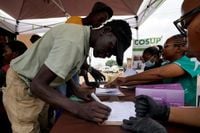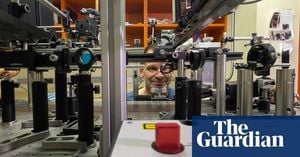In the outskirts of Pretoria, South Africa, a neglected corner surrounded by trash and makeshift structures has become a refuge for dozens of drug addicts. Here, they inject themselves with potent mixtures of heroin, often sharing needles, which poses significant health risks. A dedicated team of healthcare workers has been conducting weekly visits to this site and a dozen other locations in Pretoria, offering a needle exchange program supported by the University of Pretoria and the municipality of Tshwane.
Needle exchange programs are not a new concept globally, but they have faced challenges due to the U.S. government's decision under President Donald Trump to eliminate 83% of the programs funded by the U.S. Agency for International Development (USAID) worldwide. In South Africa, where the number of people living with HIV is the highest in the world, the treatment for those affected by the virus has been severely impacted. Drug users who share needles are particularly at risk of contracting such diseases.
The team in Pretoria comprises doctors and social workers who have built relationships with drug users, encouraging them to accept opioid substitution therapy and offering treatment for diseases like HIV. The need for such assistance is growing. A report from the University of Pretoria last year estimated that 84,000 people inject drugs in the country, with Pretoria itself showing a staggering HIV incidence of 38%. In comparison, the overall HIV incidence in South Africa exceeds 12%, according to government data.
The report also indicated that the country's drug market for cocaine, heroin, and methamphetamines is valued at approximately $3.5 billion and is on the rise. However, the impact of U.S. aid cuts brings uncertainty. Although the community-oriented substance use program in Pretoria is fully funded by the municipality and the university, it is indirectly affected by the ramifications on the global aid system. Some non-profits that collaborate with the program have shut down, and at least one local health clinic that provided services in Pretoria has closed its doors, forcing patients to rely on often overcrowded and poorly funded government facilities.
Now, harm reduction programs like the one in Pretoria will face intense competition for dwindling resources. During consultations, Phumulani Mahlangu, a 30-year-old man, expressed regret over his situation. He is addicted to a mixture of heroin known locally as nyaope and is homeless, with three children living almost 200 kilometers (124 miles) away. "In 2013, I experimented with nyaope with friends. I had never felt such relaxation before," he recalled while preparing a syringe. "I started spending my own money on it, and that's how I ended up here." He participates in the needle exchange program.
Dipolelo Lekota, one of the few female drug users at the site, is struggling to overcome her addiction to care for her child, who is being looked after by relatives. She mentioned that she can access HIV medications and clean needles through the visiting project to avoid infecting others.
Likwa Ncube, who leads the project in parts of Pretoria, acknowledged that drug withdrawal can be painful as individuals transition to methadone. "It's not something easy to handle," he said. The challenge is to help them get through it. Ncube pointed out that the program, like others around the world, has been unfairly accused of facilitating or encouraging drug use by providing needles. "It can seem like you're enabling someone to use (drugs), but we could make the same argument with condoms," he noted. "When we distribute condoms, are we saying we're encouraging people to have sex?"
The need for effective harm reduction strategies is more pressing than ever as the landscape of drug use and addiction continues to evolve in South Africa. With the drug market expanding and the incidence of HIV remaining alarmingly high, programs like the one in Pretoria are crucial in providing support to those affected by addiction and preventing the spread of diseases.
The Associated Press receives financial support from the Gates Foundation for coverage of global health and development issues in Africa. AP is solely responsible for all content. For more information on AP's standards for working with philanthropies, a list of sponsors, and areas of funded coverage, visit AP.org.




